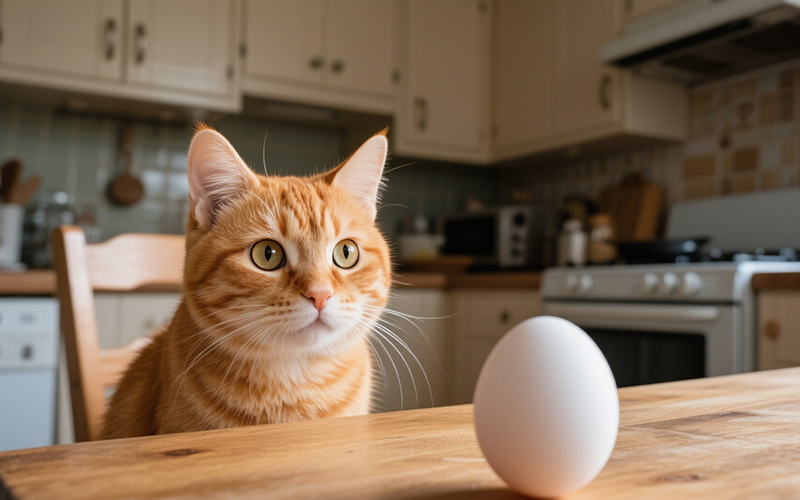Can Cats Eat Mushrooms? A Guide to the Fungal Food and Your Feline Friend
- 29 Mar 2025 11:08
Mushrooms are a common ingredient in many dishes, adding flavor and texture to meals. But as a cat owner, you might be wondering, “Can cats eat mushrooms?”While mushrooms are safe for humans and some animals, they can pose health risks for cats. Let’s break down the potential dangers and whether mushrooms should be included in your cat's diet.

Are Mushrooms Safe for Cats?
The answer depends on the type of mushroom. Store-bought mushrooms, like the white button mushrooms commonly found in grocery stores, are generally safe for cats in small quantities. However, wild mushrooms can be extremely dangerous for cats, as some varieties are highly toxic and can cause severe illness or even death.
Why Cats Should Avoid Mushrooms
Even though some store-bought mushrooms are not toxic, there are a few reasons why mushrooms should generally be avoided in your cat's diet:
Digestive Issues: Cats are obligate carnivores, meaning their digestive system is designed to process meat, not plant-based foods. While some cats may tolerate small amounts of mushrooms, they can cause gastrointestinal upset, including vomiting, diarrhea, or bloating, especially if consumed in larger quantities. 🍽️
Toxic Wild Mushrooms: The real danger lies in wild mushrooms, which can be incredibly toxic to cats. There are several species of wild mushrooms that contain toxins capable of damaging a cat’s liver and kidneys, leading to potentially fatal poisoning. Symptoms of mushroom poisoning in cats include vomiting, diarrhea, lethargy, loss of appetite, and jaundice (yellowing of the skin or eyes). If you suspect your cat has eaten a wild mushroom, it’s crucial to seek veterinary care immediately.
Unnecessary for Their Diet: Mushrooms don’t provide significant nutritional value to cats. Cats need a high-protein diet, and mushrooms are low in protein and essential nutrients. Including mushrooms in their diet doesn’t benefit them, and they may only introduce unnecessary risks.
What Should You Do If Your Cat Eats a Mushroom?
If your cat eats a small amount of store-bought mushrooms, it’s unlikely to cause immediate harm, but it’s still important to monitor for signs of digestive upset. If your cat eats a wild mushroom, or if you notice any symptoms of poisoning (such as vomiting, diarrhea, lethargy, or jaundice), contact a pet health professional or use PettureX, the pet AI software, for immediate consultation. PettureX offers 24-hour online support and pet image recognition, allowing you to quickly check whether your cat has consumed a toxic substance. 📱
Safer Alternatives for Cats
If you’re looking to treat your cat, there are plenty of safe, healthy, and protein-rich foods that will keep your feline friend happy and healthy. Here are a few alternatives to mushrooms:
Cooked Meat: Plain, cooked chicken, turkey, or fish are excellent sources of protein for cats and should be the cornerstone of their diet.
Catnip: A safe and enjoyable treat that can provide mental stimulation and entertainment for your cat.
Small Portions of Vegetables: While cats don’t require vegetables in their diet, some cats enjoy small amounts of cooked vegetables like carrots or peas. These can provide fiber and a bit of variety in their snacks.
High-Quality Cat Food: The best way to ensure your cat gets the nutrients they need is by feeding them high-quality commercial cat food that’s formulated for their specific needs.
Conclusion
In conclusion, while store-bought mushrooms are not toxic to cats in small amounts, they aren’t a necessary or ideal food for them. It’s best to avoid giving your cat mushrooms altogether, as their digestive system is better suited to animal-based protein sources. Additionally, wild mushrooms can be highly toxic and should be kept far out of your cat's reach. If you're ever uncertain about what foods are safe for your cat, tools like PettureX can offer quick advice and ensure your cat’s health and safety. Keep your feline friend healthy and happy by sticking to their proper diet! 🐾
Related

Can Cats Eat Egg Yolk Raw? A Vet's In-Depth Guide to Feline Nutrition & Safety
- 10 Jun 2025
Can Cats Eat Dog Kibble? Unpacking the Nutritional Mismatch!
- 29 May 2025
Can Cats Eat Deli Turkey? Slicing Through the Facts for Your Feline!
- 29 May 2025
Can Cats Eat Deer Meat? Exploring Venison for Your Feline!
- 28 May 2025
Can Cats Eat Corned Beef? Unpacking This Salty Human Delicacy!
- 28 May 2025
Can Cats Eat Cooked Rice? The Grain Truth for Your Feline Friend!
- 27 May 2025
Can Cats Eat Cornbread? A Crumb of Truth for Curious Cat Owners!
- 27 May 2025
Can Cats Eat Cooked Meat? Sizzling Facts for Your Feline's Feast!
- 26 May 2025
Can Cats Eat Chili? Spicing Up the Truth About This Human Dish!
- 26 May 2025
Can Cats Eat Chicken Eggs? Cracking the Code on This Feline Food Query!
- 24 May 2025
